Are Vintage Guns a Good Investment?
Vintage firearms are an arsenal of investment potential. The exciting world of gun collecting awaits, and here’s how to get in on the action.
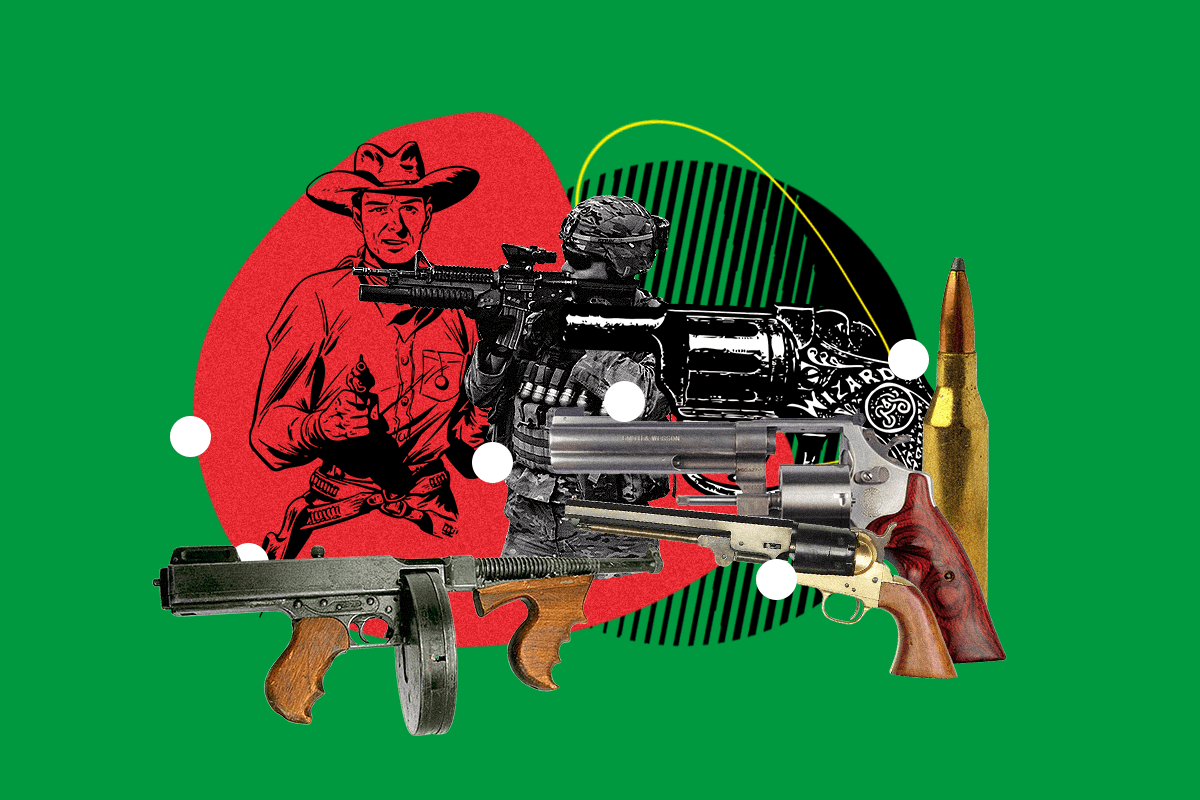
If you’re lookin’ to make a buck, then you’ve come to the right place. Investing in antique guns is a great way to add some serious firepower to your portfolio. From George Washington’s saddle pistols to Teddy Roosevelt’s double-barreled shotgun, these vintage firearms can fetch some serious cash.
Investors must understand the market trends, current values, and historical significance of the firearms they are interested in purchasing.
Just take a look at some of the prices these guns have sold for: George Washington’s saddle pistols sold for $1,986,000 at Christie’s auction house, and Simon Bolivar’s flintlock pistols sold for $1,687,500. A gold-inlaid Colt Model 1849 Pocket Revolver sold for $1.1 million, and Teddy Roosevelt’s shotgun fetched $852,500 in private sales. So, saddle up and join the wild world of antique gun investing.
Types of collectible guns
There are various types of collectible and vintage guns on the market, but most of them fall into three main categories.
1. Western Firearms
The first vintage guns people collect are often the ones we’d see cowboys using due to a worldwide fascination with the American Wild West. Rifles and pistols from the frontier era continue to captivate firearm collectors to this day.
The most desirable of these weapons were typically created between the 1870s and 1910s, with manufacturers such as Winchester and Colt being the most prominent. Guns made before 1898 are the easiest to obtain in the U.S. without a license because they’re often considered ‘antique’ or obsolete.

Source: collectorsfirearms.com
2. Military Firearms
Military firearms used in major conflicts or belonging to historical figures are also highly sought after by gun enthusiasts. These collectible firearms are not limited to a specific period or region but can be from a range of places and time periods.
European and American service firearms used in conflicts such as the American Civil War, World War I & II, and the Vietnam War typically fetch the highest prices. However, we may see the prices of guns from later conflicts, such as the Gulf war, begin to rise as well.
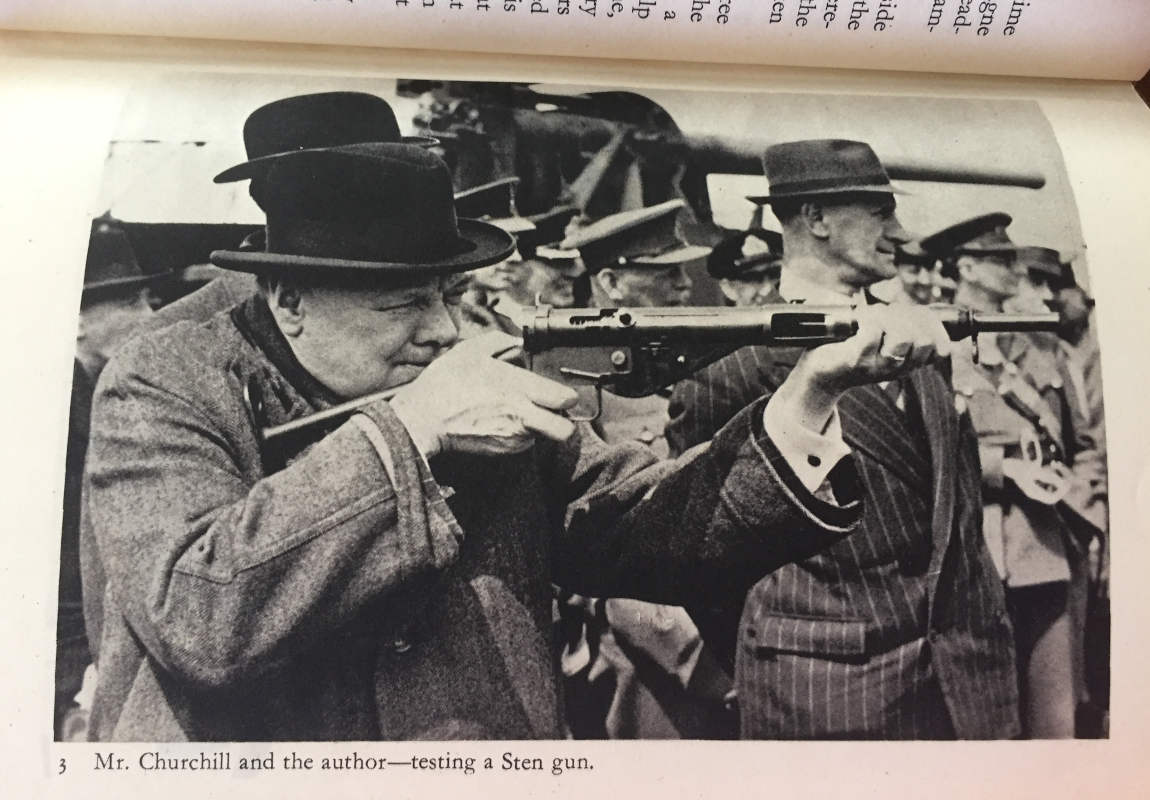
Source: churchill-collector.com
3. Handguns
Although they do not necessarily hold the same cultural significance as historical rifles, handguns are also valuable to gun owners. The most expensive vintage gun ever auctioned, a single-action army Colt revolver owned by Pat Garret, which was used to kill the outlaw Billy the Kid, sold for $6.03 million.

Source: Reuters.com
This sale highlights how western firearms, military firearms, and handguns with interesting backstories can overlap and have a significant financial impact on their owners.
Best vintage gun brands to collect
The brand of a vintage gun is just as important as the type and era to firearm collectors. Let’s look deeper at the brands that collectors are arming themselves with.
Colt
Colt pistols are the premier firearm in any vintage gun collection because of their legendary status. While Colt made many different types of pistols in the 19th century, the rarest were those produced during Samuel Colt’s lifetime (between 1830 to the early 1860s), and they’re considered some of the best classic pistols to invest in.
However, the Colt Single Action Army revolver AKA the ‘peacemaker’ wasn’t released until 1872. Numerous American law enforcement officers and outlaws used this iconic long-barreled revolver. Today, this style of gun can fetch thousands of dollars at auction. For example, first-generation Colt SAAs can sell for anywhere between $5,000 to $50,000 depending on factors like their provenance and condition.
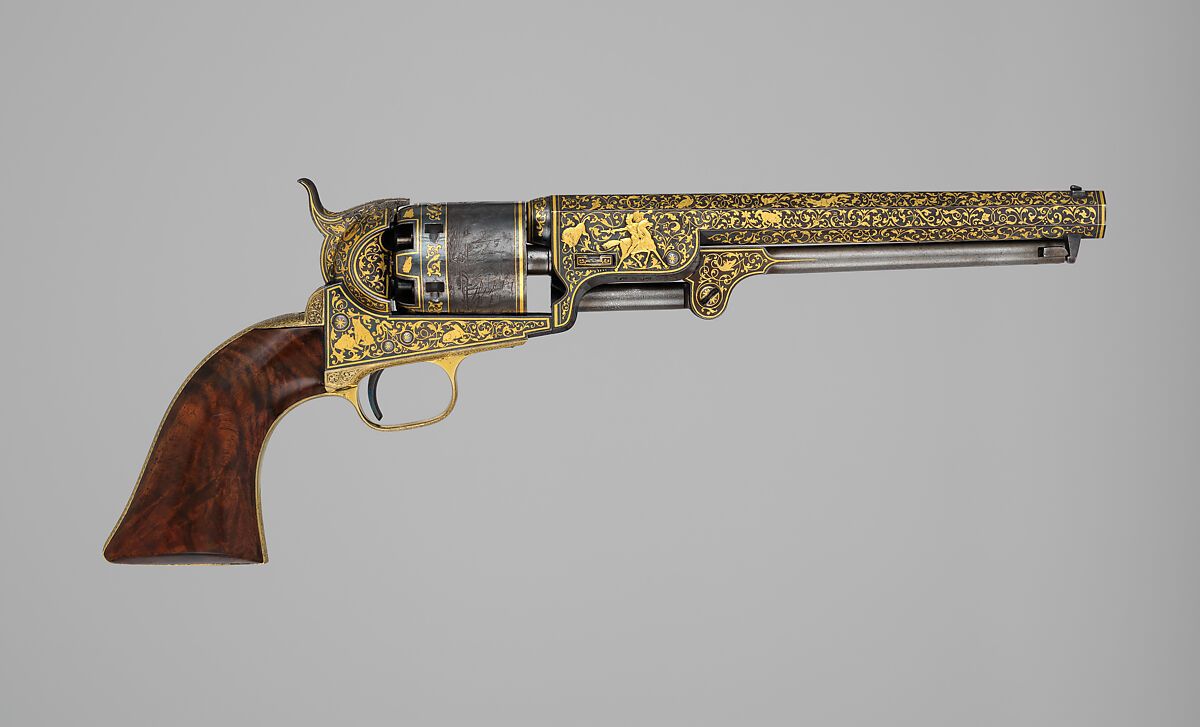
Source: metmuseum.org
Winchester
Another influential American firearm manufacturer is the Winchester Repeating Arms Company, which first launched in the antebellum period. The Winchester company is best known for its series of repeating rifles, the most popular of which is the Winchester 1873 lever-action rifle, AKA the ‘rifle that won the west.’
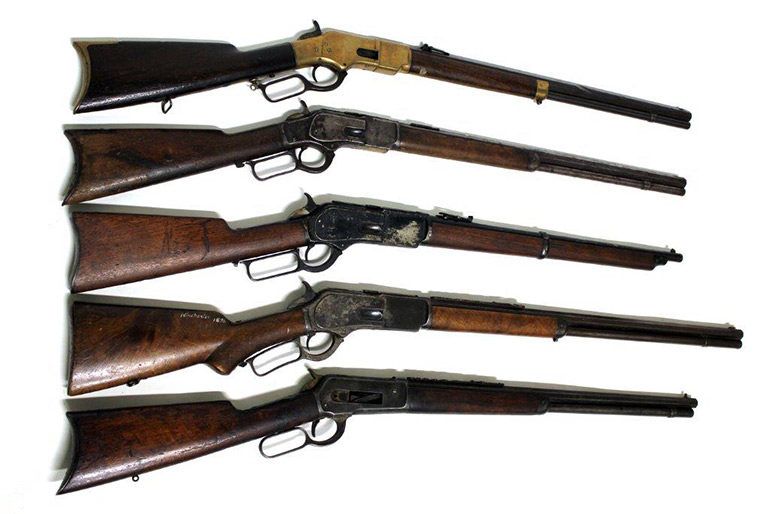
Source: nationalmuseumpublications.co.za
First-generation rifles are always more valuable than their later counterparts. However, many in the gun collecting community consider vintage Winchester rifles, lever action rifles, and shotguns to be the most valuable vintage guns of the 19th century.
Derringer
Philadelphia gunsmith Henry Deringer first released his eponymous pocket pistol in the 1820s. In the wake of Lincoln’s assassination, the public’s growing fascination with the infamous pistol caused several other firearm companies to replicate the Derringer pistol. Derringer slowly lost control of the market because of these knockoff versions.
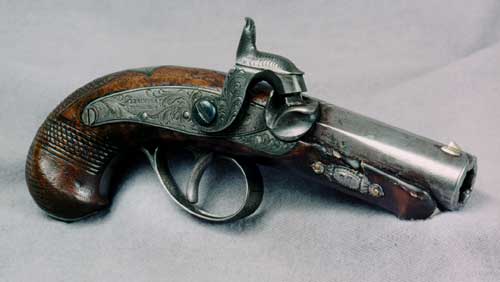
Source: archives.fbi.gov
Due to their compact size and single-shot to quadruple-shot design, these pistols don’t sell for substantial amounts at auction (usually only between $500 to $2,000 on average) but are featured in many firearm collections.
Smith & Wesson
Smith & Wesson, a stalwart in the firearms community, began its partnership and manufacturing venture in 1852. Founded by Horace Smith and D.B. Wesson, the company initially released a series of firearms with self-contained projectile capabilities, which made percussive weapons obsolete.
The most valuable is the Model 3, which can sell for a few thousand to tens of thousands of dollars. For instance, a 1907 long-strap model 3 sold for around $12,500 at a private sale.
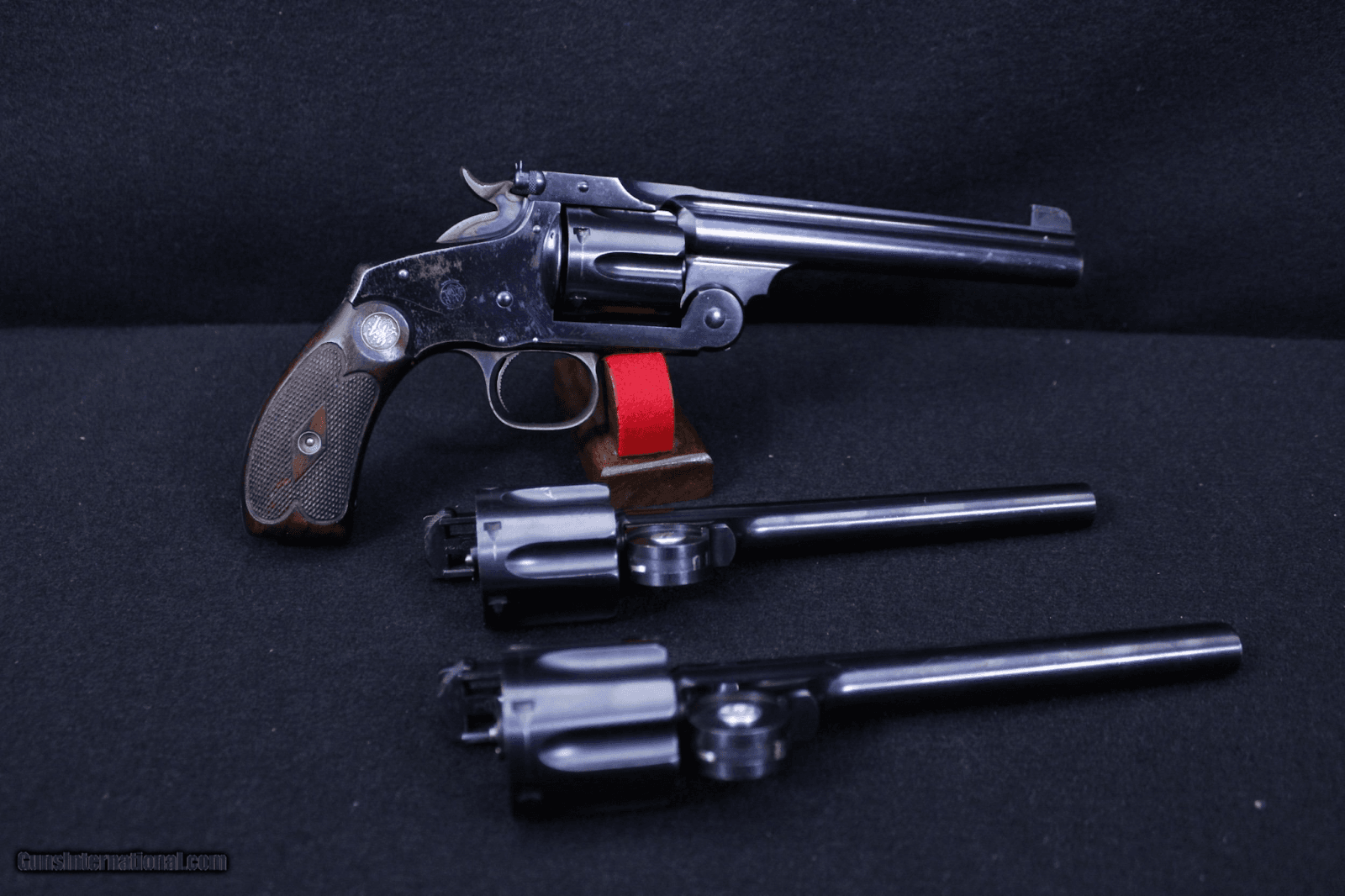
Source: gunsinternational.com
Why gun collectors invest in vintage firearms
There are several factors that a gun collector must consider to determine the value of collectible guns.
Historical significance
Guns with a historical background involving famous figures or notable events can fetch a much higher price than their run-of-the-mill counterparts. In other words, the provenance of a vintage gun makes a significant difference in the value of a firearm.
Rarity
The rarity of a gun can drastically impact its value. For instance, a limited edition or one-of-a-kind gun can be worth significantly more than a typical model.
Condition
The condition of a gun is also an essential factor in determining its value. A well-preserved and rare firearm will typically fetch a substantially higher price than a similar one in poor condition. Whether or not a collectible gun function is typically not as important as its aesthetics.
Brand recognition
Certain brands, such as Colt and Winchester, have a strong reputation, making them highly sought after by collectors. For example, a first-generation Colt Single Action Army revolver can sell for up to $50,000 depending on its condition and its previous owners.
Age
The age of a gun will also affect its value. Generally, older guns are considered more valuable than newer ones. For example, a Winchester 1873 lever-action rifle is regarded as one of the most valuable antique guns of the 19th century and can easily be sold for thousands of dollars.
History
Firearms with intriguing histories have significant potential for investment. This is particularly true for firearms owned by prominent individuals, such as military personnel and law enforcement, due to the nature of their work. The more famous the owner, the more likely the market will overlook other factors in determining the firearm’s value, such as age and condition.
Benefits of investing in a gun collection
The vintage gun asset class offers a fun and interesting investment. It’s not just a store of value, but also a conversation starter or a historical relic. And hey, you may be able to loan your collectible gun to a museum and rake in some extra dough.
- Vintage guns can have historical significance in addition to aesthetic and financial value.
- Vintage guns with a historical connection can potentially fetch higher prices at auction. Firearms used by famous figures or in notable events are likely worth the most.
- Vintage guns can be heirlooms passed from generation to generation. Even if the gun is over one hundred years old, it may still work perfectly and allow people across time to appreciate its craftsmanship and historical significance.
- Rare and sought-after collectible guns increase in value over time, with some estimates suggesting that vintage guns can appreciate by around 3% to 5% annually. This can provide a stable return on investment that’s not dependent on the stock market or economic factors
- Vintage guns can be a wise way to diversify your investment portfolio.
How to start gun collecting
Here are some things you can do to get the best and most profitable firearms in your collection.
Research the market
Investors must understand the market trends, current values, and historical significance of the firearms they are interested in purchasing. This knowledge will help to make informed decisions and identify valuable pieces for vintage gun collections.
Specialize in a brand or era
To identify valuable pieces and make better investment decisions, collectors focus on a specific type of firearm or manufacturer and become an expert in them.
Specializing in one area allows for a deeper understanding of that niche within the market, making it easier to identify valuable pieces through market research.
Attend gun shows and auctions
Collectors should attend gun shows and keep an eye on auction platforms such as Goldin to view a wide selection of vintage guns and to further connect with other collectors. This will help you stay up-to-date on market trends and find valuable pieces that may not be available through other channels.
Buying from reputable dealers
Interested collectors should purchase vintage guns from reputable dealers that can provide certificates of authenticity and proof of provenance. This will help to ensure that you build genuine gun collection and can verifya transparent chain of ownership of your pieces. Reputable online platforms like Rally make it easy to buy and sell verifiably genuine collectibles.
Diversify
It’s necessary to diversify when investing in a gun collection. Collectors should collect different types of firearms from various historical periods to decrease exposure risk and increase the chances of a profitable return on investment. Also, collectibles should only be a small slice of a well-diversified investment portfolio.
Patience is key
Be patient, as a successful vintage gun investment can take time. Although the value of a vintage gun can take years or decades to appreciate, it can provide a substantial return on investment with proper research and an adequate understanding of the market.
Drawbacks of investing in historic guns
Investing in collectibles like vintage guns have several drawbacks to consider.
Legal restrictions
The biggest legal obstacle to investing in vintage guns are varying laws and regulations regarding firearms ownership, possession, and transfer. Since these laws can vary by state or country, it’s vital to understand your legal requirements to ensure compliance.
For example, U.S. states like California, New York, and New Jersey have strict gun control laws that make it difficult for residents to own certain firearms. In contrast, states like Texas and Florida have less stringent regulations.
Logistics
Most vintage firearms are delicate and require proper storage and maintenance to preserve their value. Transporting such items may cost significant amounts to ensure they reach their destination undamaged. Additionally, buying and selling firearms requires time-consuming background checks and paperwork, so be ready for that if you’re looking to start collecting guns.
Cultural views
Cultural obstacles can also affect investment possibilities in collectible vintage gun markets. For example, some people may view firearms as controversial or see them in a negative light. This may make it more challenging for you to find vintage gun buyers in certain areas or jurisdictions.
Regulations for gun enthusiasts
Gun trading and vintage gun collecting is a highly regulated business. Here are a few things you should know before investing in a gun collection in the U.S.
Licensing
People who wish to buy or sell non-antique guns must obtain a Federal Firearms License (FFL). On the other hand, individuals who want to build a gun collection of specific older, certified firearms require a Collector’s Federal Firearms License.
Gun storage
The Bureau of Alcohol, Tobacco, Firearms, and Explosives (ATF) requires gun owners to keep their firearms in a secure location, like a gun safe, gun case, lock box, or a secure container.
Transportation
Owners can transport their guns as long as they keep transportation restricted to places where possession is legal. However, when transporting firearms, individuals must ensure that the firearms are unloaded and not easily accessible.
Will you shoot for a profit as a gun collector?
Investing in vintage guns can be challenging yet gratifying. It requires knowledge of the market, regulations, and laws, and a clear understanding of the cultural and logistical challenges of the asset class.
Despite the barriers, demand for vintage guns is continuing to grow as more collectors and investors recognize the value and historical significance of antique firearms.
As with any investment, it’s crucial to perform the necessary due diligence, understand what you’re getting into, and seek professional advice before making any decisions. With the right approach and an adequate understanding of the market’s future, investing in vintage or antique guns could become a valuable addition to any investment portfolio.
